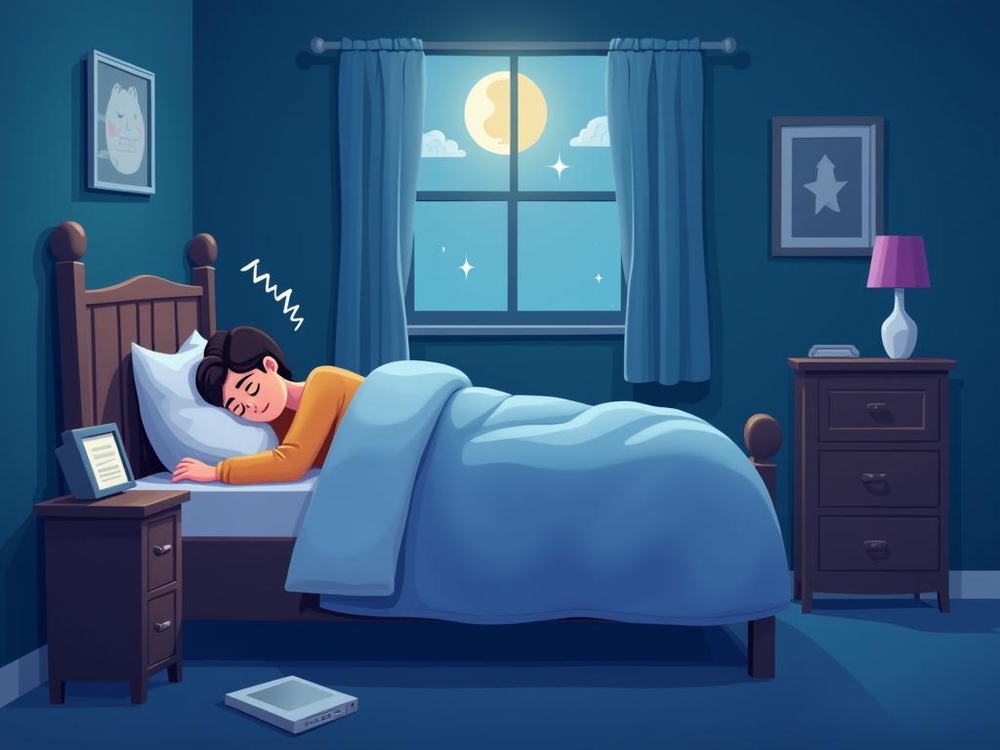Published
- 5 min read
Impact of Screen Time on Sleep Hygiene

More screen time in bed can lead to insomnia
The risk rises and sleep duration drops the more you use a screen at bedtime, a new study finds.
Key takeaways
- An hour of in-bed phone or tablet use raised insomnia risk by nearly 60 percent and lowered sleep duration by about a half hour, a new study showed.
- Social media scrolling didn’t have a greater impact on insomnia risk than other screen activities.
- The researchers say that even small reductions in screen use at bedtime can lead to better sleep.
I’ve always stressed the importance of good habits. That phone you’re holding at bedtime? It might be stealing your sleep. A study from Norway found more screen time in bed significantly raises the chance of insomnia.
Specifically, an hour of in-bed screen time increased insomnia risk by nearly 60 percent and lowered sleep duration by about a half hour.
”We were particularly interested in whether social media — because of its interactive and potentially emotionally stimulating nature — would have a stronger association with poor sleep outcomes than other screen activities,” says the study author, a senior researcher at the Norwegian Institute of Public Health in Bergen.
”Surprisingly, we found that it’s the overall screen time in bed that matters most, not the type of activity,” the researcher explains.
Sleep troubles grow as screen time increases
The research team analyzed survey responses from over 45,000 adults aged 18 to 28.
Participants were asked whether they used screens after going to bed, for how long, and how many nights per week. They also recorded their common screen activities: watching shows or movies, gaming, social media, surfing the internet, listening to audio such as podcasts, or reading.
The survey asked when they typically went to bed, got up in the morning, and how long they usually took to fall asleep. Participants indicated how often they had trouble falling or staying asleep, felt sleepy during the day, and how long their sleep problems lasted.
Insomnia was defined as having trouble sleeping and experiencing daytime sleepiness at least three times a week for three months.
The results showed that one more hour of screen time in bed was linked to a 59 percent higher risk of insomnia and 24 fewer minutes of sleep on average.
The researcher stresses that insomnia symptoms and reduced sleep duration were associated with increased screen use.
They add that these findings are limited since they rely on self-reported data from a narrow population (young adult Norwegians) without scientific sleep measurements.
Why you should avoid your phone before bed
Many health experts recommend avoiding screens entirely in the hour before bedtime.
”Screen time at bedtime activates the mind,” says the director of sleep medicine at the University of Washington in Seattle, who was not involved in the study. “If the individual is consuming content that is very interesting, they may delay going to sleep. If the content is disturbing or anxiety-inducing, this could make it hard to fall asleep.”
Blue light from screens may also promote wakefulness. “Blue light from screens suppresses melatonin production, a hormone essential for initiating sleep,” says a sleep physician.
Tips to break the bedtime screen habit
The expert offers tips to prevent wakefulness from screens and get better sleep:
- Avoid screens 30 to 60 minutes before bedtime.
- If you must use screens, lower brightness as much as possible.
- Use phone features like Night Shift, which reduces blue light, and Do Not Disturb, which silences notifications, calls, and alerts.
- Replace screen time with a relaxing bedtime ritual like reading a book or gentle stretching.
- Consider an old-fashioned alarm clock to reduce the temptation to use your phone.
”Our study shows even small reductions in screen time could improve sleep quality and duration,” says the researcher. “It’s not about quitting screens entirely—it’s about being mindful of how and when we use them, especially at night.”
Does screen time affect sleep?
Yes, screen time can drastically impact sleep. Studies point out that spending more time on screens, especially before bed, can lead to poor sleep quality. This often results in insomnia, where falling and staying asleep becomes difficult. The longer you stare at a screen, the harder it may be to get a restful night of sleep. The blue light emitted from screens is a big reason for this. It disrupts the natural sleep-wake cycle by blocking melatonin production, a hormone that tells our brain it’s time to sleep.
Reducing screen time, particularly before bedtime, is crucial for better sleep quality. Experts suggest cutting off screen use at least 30 minutes before bed. People can replace that time with calm activities like reading a physical book or meditating. Over time, it can help reset your body’s clock and improve sleep. Better sleep can boost productivity, improve mental health, and even enhance physical health.
Summary
This article discussed how increased screen time at night raises insomnia risk and lessens sleep duration. Reducing screen time, especially before bedtime, can improve sleep quality. Making these changes is about mindfulness, not perfection. Next, consider small steps to reduce your nightly screen time. Your future self will thank you.